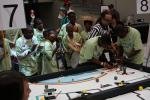Jwet Pa Ou: Haitian Students Compete in Lego Robotics Challenge
 Rough roads, sporadic electricity, out-dated ports, and rural areas in need of irrigation. Haiti needs Haitian engineers badly. The prerequisite is students who understand and have a passion for math and science. In January 2007, a group of Cap Haitian students (Team Citadel), with the support of Mark Moorman, a Haitian Businessman, and Rotary International, participated in the First Lego League Robotics Challenge in Florida. In April 2009, they again competed in Atlanta. Some of these students may one day become leaders in addressing their country's considerable infrastructure needs.
Rough roads, sporadic electricity, out-dated ports, and rural areas in need of irrigation. Haiti needs Haitian engineers badly. The prerequisite is students who understand and have a passion for math and science. In January 2007, a group of Cap Haitian students (Team Citadel), with the support of Mark Moorman, a Haitian Businessman, and Rotary International, participated in the First Lego League Robotics Challenge in Florida. In April 2009, they again competed in Atlanta. Some of these students may one day become leaders in addressing their country's considerable infrastructure needs.
When I was a Peace Corps Volunteer, we often described the program as an exchange. This was only partially true. We, the Americans, were able to travel to Haiti with relative ease. We did not have to pay an enormous sum of money to stand in line for hours, in the off chance of getting a visa so we could visit another country, even for a short period of time. The default answer for an American is not no. Haiti does not flood the United States with missionaries, aid workers, and journalists seeking to save it, help it, or write about it. Very few of the Haitians we worked with had the experience of visiting, let alone working, in the United States.
There is a Turkish Proverb, "In travel, there is wisdom." Travelling to another country can be a life-changing experience, there is no doubt about that. Haiti has brought many good things into my life, which explains why, five years after leaving, I still find myself writing about the country late at night.
So I was glad to see that these young Haitians had the opportunity to travel to the United States to experience another country, culture, and to develop a passion for the skills that their country is in great need of. It is an invaluable experience.
But given how expensive these exchanges are, I also recognize how difficult scale up is. So I ask myself what can be done to improve science and match curiculla in Haitian Schools. Part of the problem is that there is no such thing as the Haitian school system. There are only systems - government schools, private schools, faith based schools, and community initiated schools.
It can be painful to watch a class in rural Haiti. The teacher, who may or may not have been paid last month, speaks bad French and is insecure about it. S/he has the students recite phrases verbatim and reserves the right to hit a student if need be. No analysis, no critical thought, no application to Haiti's challenges. In the afternoon, the recitation of monotone French by studying students becomes almost hypnotic.
Haitians are hands on people. Perhaps a similar form of competition can be replicated in Haiti for high performing math and science students. The government could help FOKAL create a nationwide network of libraries and computer centers that students, no matter where they study, could take classes or instead teach themselves. You would be amazed how quickly students with little computer experience can learn the basics of internet research.
I do hope Team Citadel, as Haiti's pionerring group, will remain competitive against other countries. But more than this, I hope that they will soon have increased competition from within Haiti.
Welcome your thoughts.
Bryan
Add new comment